IUP publications features an interview with Prof Bandi Kamaiah
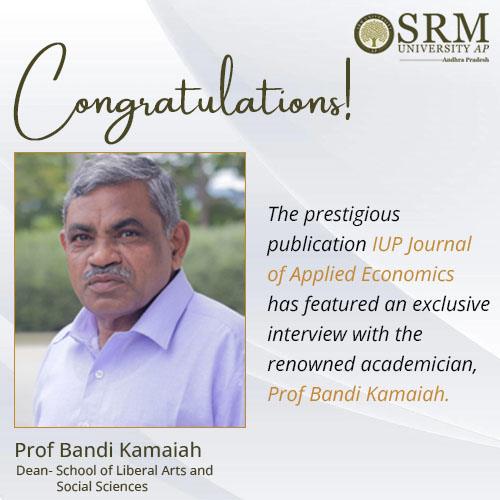
‘An interview with Professor Bandi Kamaiah’ was featured in the leading publication, IUP Journal of Applied Economics. Analysing the issues of Micro, Macro, Development and Energy economics, the journal features papers on Industrial economics, Public finance, Industry, Agricultural, Rural economics, etc. Having published interviews with eminent Professors like Professor K L Krishna, Professor Dilip Nachane, Professor U Sankar, Professor S Mahendra Dev, and Professor Ashima Goyal, the dialogue with Prof Bandi Kamaiah is the sixth in the series.
In the interview with Prof Bandi Kamaiah, Department of Economics, SRM University-AP, GRK Murty narrates the transformational journey of Prof Kamaiah from the son of a tenant farmer to an estimable researcher who went on to occupy the position of the President of ‘The Indian Econometric Society’ (TIES). The interview presents an enriching account of the veteran’s life who crossed innumerable hurdles to nurture his passion and became an ‘agent of change’ in the lives of several hundreds of first-generation students from the margins of society, by shaping them into accomplished professionals.
The evocative dialogue with Prof Kamaiah extends an open doorway to several inspiring phases of his life that modelled him into a “towering intellectual” and “outstanding teacher”. His collaboration with pre-eminent economists like Prof P R Bramhananda, Prof Dilip Nachane, and Prof C Rangarajan motivated him to build a career in monetary economics. He has successfully guided 50 PhDs and an equal number of MPhil dissertations from almost every facet of economics and published more than 160 papers in national and international journals.
The interview explicates his association with various institutes of prestige including the National Institute of Bank Management (NIBM), Indira Gandhi Institute of Development Research (IGIDR) and the University of Hyderabad. As the founding father of the School of Economics at the University of Hyderabad, he has also introduced a two-year employment-enhancing master’s program in Financial Economics. His amicable and free-spirited approach made him one of the most sought-after teachers among the student community. He has a unique way of nurturing students and guiding them through the process of academic research.
Prof Kamaiah also articulates his views on the economic landscape of the country, the possible impact of its monetary and fiscal policies in the post-pandemic scenario, the growing correlation between the domestic and global stock markets, and the deepening relationship between energy consumption, real GDP, CO2 emissions, and such other climate-related issues. Airing his concerns about the outmoded syllabus and stagnant curriculum, he reiterates the need to renovate university education, hopefully, through the framework created by NEP 2020. He believes, creating specialised institutions would be a better way to train professionals who would become market ready and employable.
In his opinion, ‘Centres of Economic Excellence’ in different regions of the country will give rise to a strong pool of economists well-trained within the country to meaningfully replace the imported economists from the West to render advice on crucial matters. “The young minds of the country should be exposed to indigenous ways of thinking, and holistically trained to appreciate our culture, resources and institutions, systems and customs, ways of living, etc. to understand local markets, expose the basis of vulgar consumerism, the beauty of self-regulation without the aid of Adam Smith’s invisible hand, and social realism in contrast to self-interest”, said Prof Kamaiah.
- Published in Departmental News, Economics Current Happenings, Economics News, News
Dr Ghanshyam Kumar Pandey to join the Editorial Board of SN Business and Economics
SN Business and Economics is a multidisciplinary journal that covers the areas of Economics, Finance, Business, and Management. Springer publishes the journal. It is supported by a team of experienced in-house editors and an international Editorial board. Recently, Assistant Professor Dr Ghanshyam Kumar Pandey from the Department of Economics was appointed as a member of the editorial board of SN Business and Economics.
He is responsible for providing feedback on an ad hoc basis to the in-house editors. He is in charge of verifying submitted papers’ suitability for external review. All SN Business and Economics editors work together to ensure that the submitted research is expertly handled. The team assesses and confirms the paper to be technically sound, academically valid, and ultimately suitable for publication.
Dr Ghanshyam Kumar Pandey will be the handling Editor for up to 3 papers per quarter. This involves nominating academic referees and making an editorial recommendation following peer review. When requested, he shall give the editorial policy or strategy feedback to the Editorial team. Initially, his tenure will last for one year.
- Published in Departmental News, Economics Current Happenings, Economics News, Faculty Achievements, News
Studying the agricultural transformation in Southeast Asia
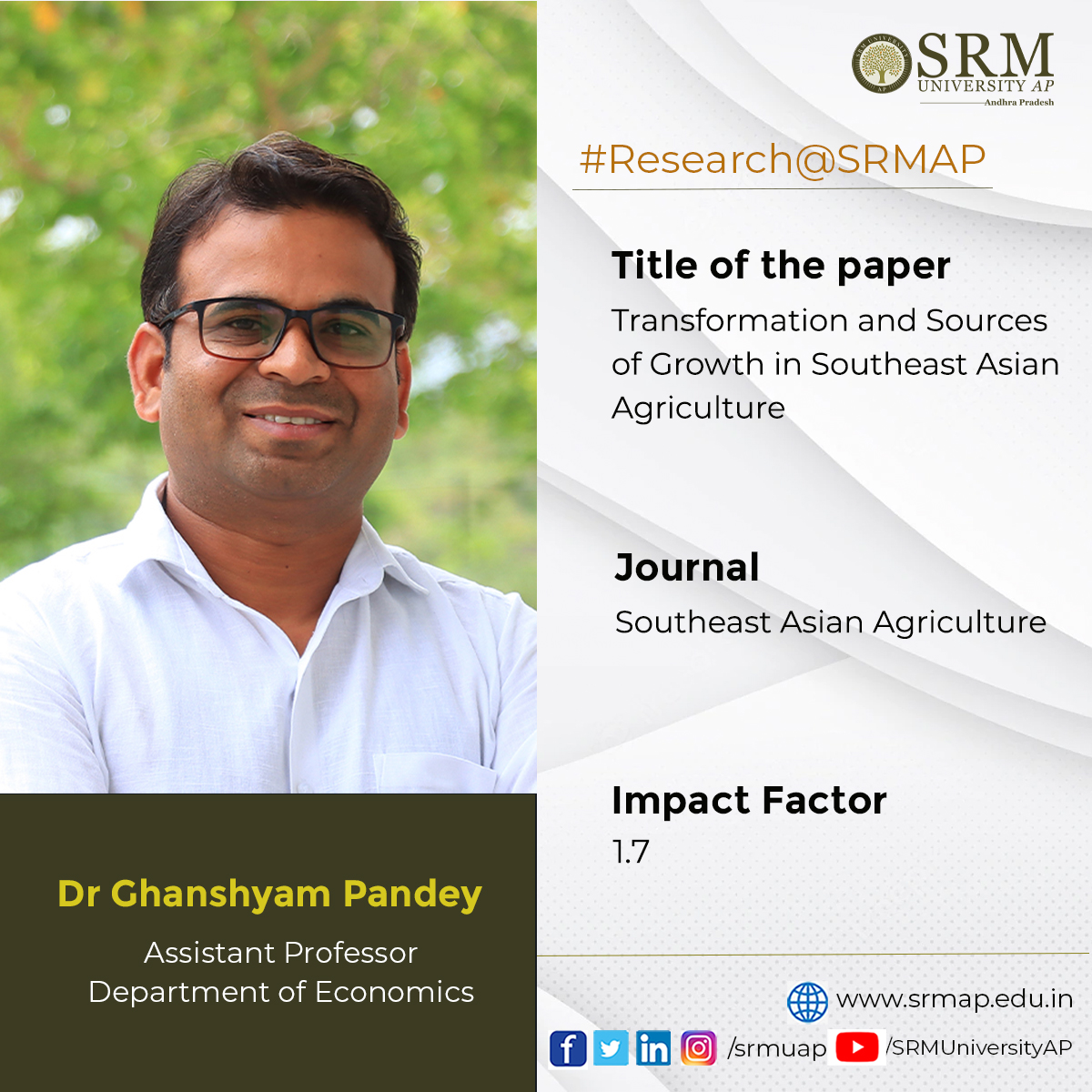
The promotion of sustainable growth of agriculture is one of the primary concerns of developing nations. The agriculture domain in Southeast Asia has undergone rapid transformation and structural changes over the last few years. Assistant Professor Dr Ghanshyam Pandey from the Department of Economics discusses the reasons for this changed scenario in his latest publication “Transformation and Sources of Growth in Southeast Asian Agriculture”. The research conducted in collaboration with International Food Policy Research (IFPRI) and the Indian Council of Agricultural Research (ICAR) was published in the Q2 journal Southeast Asian Agriculture having an Impact Factor of 1.7.
Abstract of the Research
Over the past few decades, agriculture in Southeast Asia has experienced robust growth and undergone a significant structural transformation, albeit at a different pace in different countries in the region. This paper aims to understand the agricultural transformation and growth process in Southeast Asia. The findings of this study show that driven by technological change, area expansion, and diversification, agriculture has grown faster in low-income countries in the region. In contrast, agricultural growth in high-income countries has been slow and driven by price increases, mainly of export-oriented commercial crops such as oil palm, rubber, and coconut—alongside an expansion of cropped areas under these crops. In view of the fixed supply of land and high volatility in global food prices, the area- and price-driven growth is not sustainable in the long run. For efficient, sustainable, and inclusive growth, exploiting the potential of existing and frontier technologies and diversification of production portfolios holds greater promise.
- Published in Departmental News, Economics Current Happenings, Economics News, News, Research News
Presented paper at the East Asian Economic Association Convention
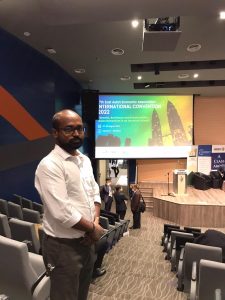
Dr J Vineesh Prakash, Assistant Professor, Department of Economics, presented a paper at the 17th East Asian Economic Association (EAEA) convention that was held on August 27-28, 2022 at Sunway University, Kuala Lumpur, Malaysia.The theme of the convention was “Growth, Resilience and Sustainability: Asian Dynamism in an Uncertain World”.
The East Asian Economic Association (EAEA) was founded in 1987 as the first international academic organisation devoted to East Asian economics. The international convention is its annual conference where papers for publication in the Asian Economic Journal are discussed.
Dr Vineesh presented the paper titled Does Business Group Affiliation Enhance Firm-Level Profitability? Evidence from Indian Automotive Component Industry, that addresses the growing competitive and volatile nature of economic sphere by testing the persistence of profit in a highly evolving emerging country environment such as India.
Emerging economies, such as India, confront different challenges than developed economies. The country has witnessed diverse regulatory environments, varying from highly regulated to more liberal ones. The more liberal environment coupled with the entry of overseas players into this realm has a definite impact on the existing industrial structure, thereby creating a volatile, ever evolving competitive environment.
The paper aims to address this issue and seeks to validate the part played by RBV in generating inimitable capabilities in a context-specific setting of a particular industry, i.e., the Indian automotive component industry. It also analyses the part played by business group affiliation in the post-reform era and its influence on profitability.
The paper found that profitability has moderate-to-high persistence and the variables, such as business group firms with overseas investments, export intensity, firm size, labour productivity growth, and past R&D intensity, have a contributory role in enhancing a firm’s profitability. Other variables such as business group affiliation, firm’s age, firm’s leverage, capital intensity, and A&M intensity have found to exercise a detrimental impact on the firm’s profitability.
Social implications of the research
The results, as reported in this paper, have some important implications for different stakeholders like managers, regulators, policymakers, etc. The finding that past R&D intensity has a positive influence on current profitability is significant to managers so they can allocate appropriate resources to fund such projects without many apprehensions.
The proof that labour productivity growth and profitability are positively related implies that managers could further focus on various in-house skill development programs to enhance labour productivity.
The finding of a positive influence of exports on profitability indicates that managers could further explore the external markets to boost up profitability as export markets are reportedly far more rewarding.
The discovery of moderate to high profit persistence has an important implication for regulators in order to facilitate healthier competition among firms. The moderate to high profitability persistence implies that the regulators have not managed to instill a reasonable level of competition in the industry through carefully crafted interventions, thereby facilitating its growth.
‘The modern Kautilya of India’: Dr C Rangarajan on India’s economic development
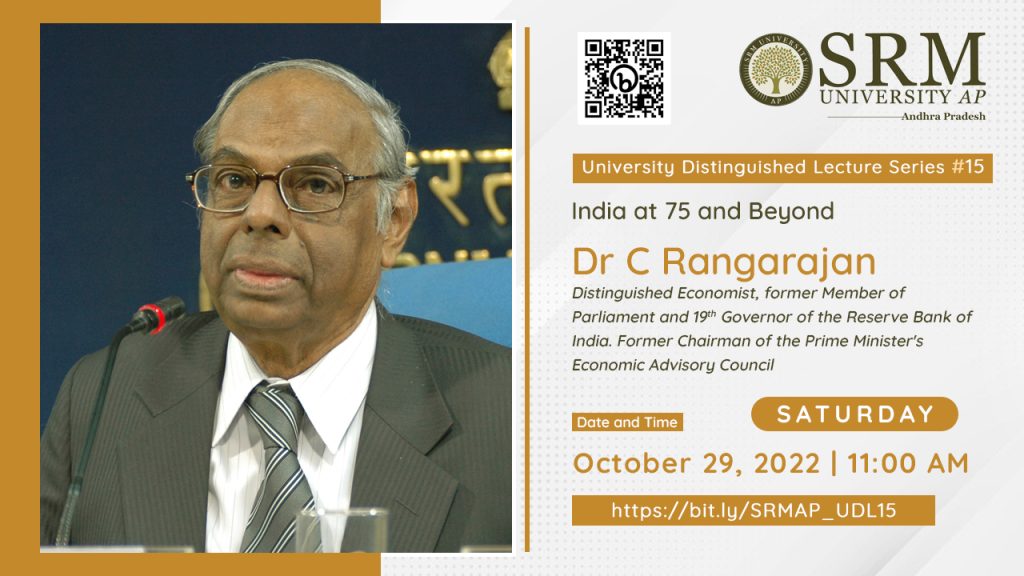 The fifteenth edition of University Distinguished Lecture series on the topic “India at 75 and beyond”, was held on October 29, 2022 to celebrate the magnificent growth displayed by India. The session was addressed by Dr C Rangarajan, renowned economist and former Governor of Reserve Bank of India. The intense and inspiring lecture highlighted the importance of reflection on the past and articulation of our vision for our future to enable rapid progression on economic development.
The fifteenth edition of University Distinguished Lecture series on the topic “India at 75 and beyond”, was held on October 29, 2022 to celebrate the magnificent growth displayed by India. The session was addressed by Dr C Rangarajan, renowned economist and former Governor of Reserve Bank of India. The intense and inspiring lecture highlighted the importance of reflection on the past and articulation of our vision for our future to enable rapid progression on economic development.
Dr C Rangarajan gave a comprehensive outlook on the economic performance of India since independence. “India has made momentous progress on reducing multidimensional poverty. The incidents of multidimensional poverty were almost reduced by half to almost 27.5% during 2005-06 and 2015-16 period due to deeper progress among the poorest. Thus within 10 years, the number of poor people in India fell by more than 270 million, a truly massive achievement,” he stated during the lecture.
Dr Rangarajan further expounded on the importance of reform agendas and measures, the subsisting triad of economic policies and the future challenges of progressing into being a developed nation. The lecture was followed by a Q & A session moderated by Dr S Ananda Rao and Dr Erra Kamal Sai Sadharma from the Department Economics.
Prof Kamaiah Bandi, Dean-School of Liberal Arts and Social Sciences applauded Dr Rangarajan on being a unique distinction of shaping and motivating five generations of intellectual cohort. “Dr C Rangarajan has successfully brought down the gap between theory and practice in his capacity as Governor of RBI and various other important positions he has held for our nation. We as SRM AP look forward to your remarkable experience and knowledge to incubate motivation in our students.”
SRM University-AP has actively promoted a cumulative intellectual ecosystem and interdisciplinary education. “The principal objective of the University Distinguished Lecture series is to impel research scholars, students from all around the world to undertake progressive measures for the holistic development of our nation”, said Honourable Vice Chancellor, Prof Manoj K Arora in his welcome address.
Prof D Narayana Rao, Pro-Vice-Chancellor, SRM University-AP concluded the event by addressing Dr C Rangarajan as ‘the modern Kautilya of India’ and presented a memento on behalf of the institution as a token of respect and appreciation for his esteemed presence at the fifteenth edition of the University Distinguished Lecture series.
Estimating ACEs among Young Adults in Kashmir
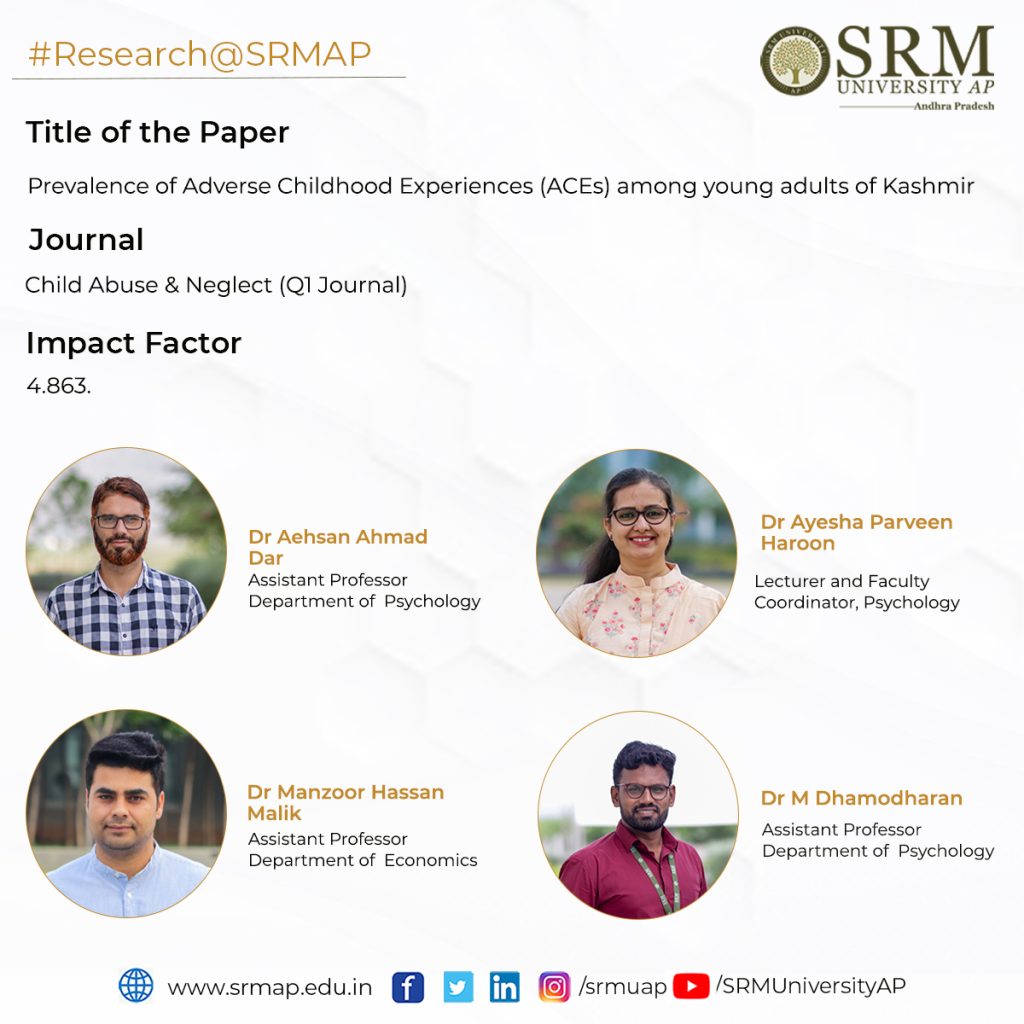
The Faculty of Psychology and Economics have jointly published a paper titled “Prevalence of Adverse Childhood Experiences (ACEs) among young adults of Kashmir” in the Q1 Journal Child Abuse & Neglect, having an impact factor of 4.863. Dr Aehsan Ahmad Dar, Assistant Professor, Department of Psychology; Dr Manzoor Hassan Malik, Assistant Professor, Department of Economics; Dr Ayesha Parveen Haroon, Lecturer, Department of Psychology; Dr Dhamodharan M, Assistant Professor, Department of Psychology have worked on interpreting the emotional constraints that are harboured among the young adults experiencing the adversities in turbulent Kashmir.
Abstract
The present study estimated the prevalence of ACEs among young adults studying in the colleges and universities of Kashmir, India. Findings disclosed that 15.4 % of the students reported high exposure to ACEs, 13.4% of the participants reported high exposure to ACEs, 26.3 % of the sample reported moderate exposure to ACEs, 33.0 % of the youth reported low exposure to ACEs and 11.8 % of the respondents reported no exposure to ACEs. The prevalence of ACEs was found to be 88.2 % (females: 82.7 % and males: 90.8 %) with a mean of 4.72 adverse events during childhood. The ACEs with the highest level of prevalence were “often or very often insulted or put down” (49.8 %), followed by “often or very often hurt physically” (47.6 %), “often or very often pushed, grabbed, or slapped” (41.6 %), “lived with a mentally ill household member” (28.3%), “touched or sexually fondled” (25.3 %),” household member being into the prison” (25.0%) and “witnessed father or mother being pushed, grabbed, slapped, or had something thrown at them” (24.0%).
Practical Implementation of the Research
The findings of the study will serve as a reliable source for healthcare professionals, policymakers and NGOs to better understand the impact of ACEs on the health and well-being of individuals. Since ACEs are associated with several immediate and long-term health hazards, therefore, necessary efforts in this direction are suggested to advocate the early targeted intervention to reduce ACEs and their impact as well as design effective measures to improve the health and well-being of young adults, thereby reducing the development of physical and mental disorders.
Collaborations
- Prof. Sibnath Deb, Rajiv Gandhi National Institute of Youth Development, Sriperumbudur, Tamil Nadu, India.
- Dr Manzoor Hassan Mali, Department of Economics, SRM University-AP, Andhra Pradesh, India
- Prof. Waheeda khan, Department of Clinical Psychology, Faculty of Behavioural Sciences, Shree Guru Gobind Singh Tricentenary University, Budhera, Gurugram, Delhi-NCR, India.
- Dr Ayesha Parveen Haroon, Department of Psychology, SRM University-AP, Andhra Pradesh, India
- Dr Amra Ahsan, Department of Clinical Psychology, Faculty of Behavioural Sciences, Shree Guru Gobind Singh Tricentenary University, Budhera, Gurugram, Delhi-NCR, India
- Dr Farhat Jahan, Department of Clinical Psychology, Faculty of Behavioural Sciences, Shree Guru Gobind Singh Tricentenary University, Budhera, Gurugram, Delhi-NCR, India
- Dr Bushra Sumaiya, Faculty of Education, Shree Guru Gobind Singh Tricentenary University, Budhera, Gurugram, Delhi-NCR, India.
- Shaheen Yawar Bhat, Department of Physiology, All India Institute of Medical Sciences, New Delhi, India.
- Dr Dhamodharan M, Department of Psychology, SRM University-AP, Andhra Pradesh, India
- Mohamad Qasim, Independent Researcher
The research cohort plans to study youth’s mental health and ascertain its risk and protective factors. About 19% of the world’s children live in India, which constitutes 42% of the total Indian population, and nearly half of these children are vulnerable and need care and protection. Due to various traumatic experiences, stress has increased among young people resulting in various physical and mental disorders.
The research will focus on the pathogenic (post-traumatic stress disorder, depression, anxiety, somatisation) and salutogenic (post-traumatic growth and resilience) consequences of trauma to help the youth withstand adverse experiences and develop psychological competence. The research will provide insights into the mental health of youth that would be helpful for the administration, policymakers, and other voluntary organisations to understand effective ways to devise and implement the best intervention programs for maximising mental health protective factors and minimising its risk factors.
- Published in Departmental News, Economics Current Happenings, Economics News, News, Psychology News, Research News
An appraisal of India’s comparative advantage in information technology exports
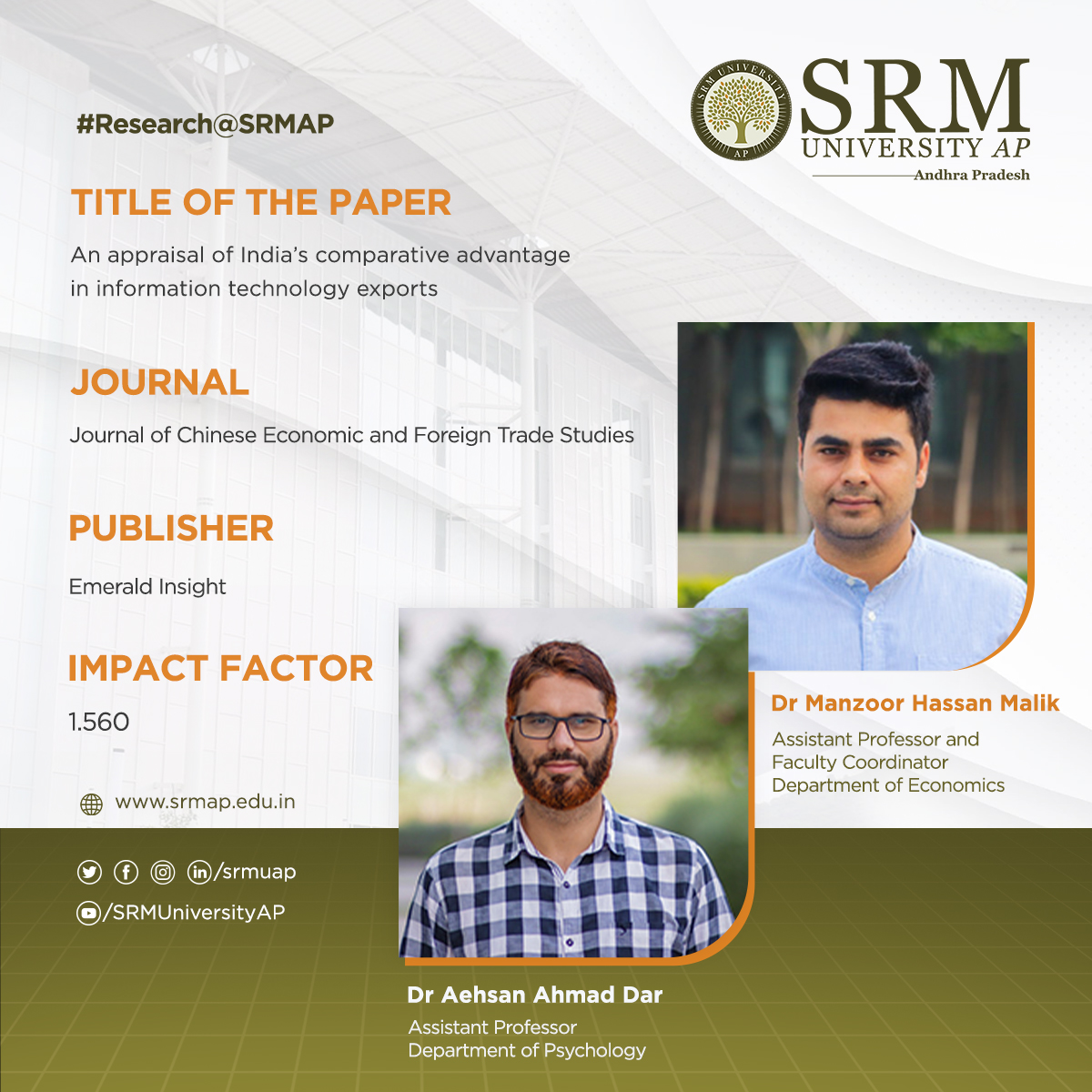 Researchers of the School of Liberal Arts and Social Sciences have worked on India’s comparative advantage in information technology exports with competing developing nations, including China, the Philippines, Malaysia, and Brazil. The latest paper published by Assistant Professor Dr Manzoor Hassan Malik, Department of Economics and Assistant Professor Dr Aehsan Ahmad Dar, Department of Psychology, has implications for attaining sustainability in IT export growth. It is suggested that policies are directed at enhancing the overall performance of the IT sector. The novelty of the present study lies in the estimation of India’s competitiveness in IT exports in relation to the group of reference countries, namely China, the Philippines, Malaysia, and Brazil. With its policy recommendations, this research is helping to shape the sustainability of the IT sector.
Researchers of the School of Liberal Arts and Social Sciences have worked on India’s comparative advantage in information technology exports with competing developing nations, including China, the Philippines, Malaysia, and Brazil. The latest paper published by Assistant Professor Dr Manzoor Hassan Malik, Department of Economics and Assistant Professor Dr Aehsan Ahmad Dar, Department of Psychology, has implications for attaining sustainability in IT export growth. It is suggested that policies are directed at enhancing the overall performance of the IT sector. The novelty of the present study lies in the estimation of India’s competitiveness in IT exports in relation to the group of reference countries, namely China, the Philippines, Malaysia, and Brazil. With its policy recommendations, this research is helping to shape the sustainability of the IT sector.
The paper titled An appraisal of India’s comparative advantage in information technology exports was published in the Journal of Chinese Economic and Foreign Trade Studies with an impact factor of 1.560.
Abstract
The purpose of this study is to estimate revealed comparative advantage and Normalised Revealed Comparative Advantage (NRCA) indices of India’s Computer and Information Services (CIS) export competitiveness about Information Technology (IT) competing developing nations, such as China, Philippines, Malaysia and Brazil. Using annual data of total exports for CIS, transportation (TNS), travel (TVL) and insurance (INS) services under service categories of the balance of payment, the present study estimates the pattern of Comparative Advantage (CA) in India’s CIS exports with respect to IT competing developing nations such as China, Philippines, Malaysia and Brazil from 2000 to 2018. The choice of the study period is determined by the availability of consistent data on IT service exports of these nations. The study also estimates the export position of CIS export in comparison to India’s traditionally strong commercial services export of TNS, TVL and INS during the study period. Both indices showed that India had a strong CA in CIS compared to the selected nations, indicating India’s relative export performance to be stronger than that of China, Malaysia, the Philippines, and Brazil. The cross-service index showed that India’s relative specialisation level in CIS with respect to the world’s average specialisation level was stronger than its relative specialisation level in TNS, TVL and INS services. Furthermore, The NRCA cross-nation index showed that India’s NRCA index score has been declining since 2010 with respect to these nations, which implied a decline in the competitiveness of CIS. On the other hand, NRCA has increased in the case of the Philippines, Malaysia and Brazil for most of the period post-2010.
- Published in Departmental News, Economics News, Faculty Achievements, News, Psychology News, Research News
Market Integration of Chickpea Crop in India
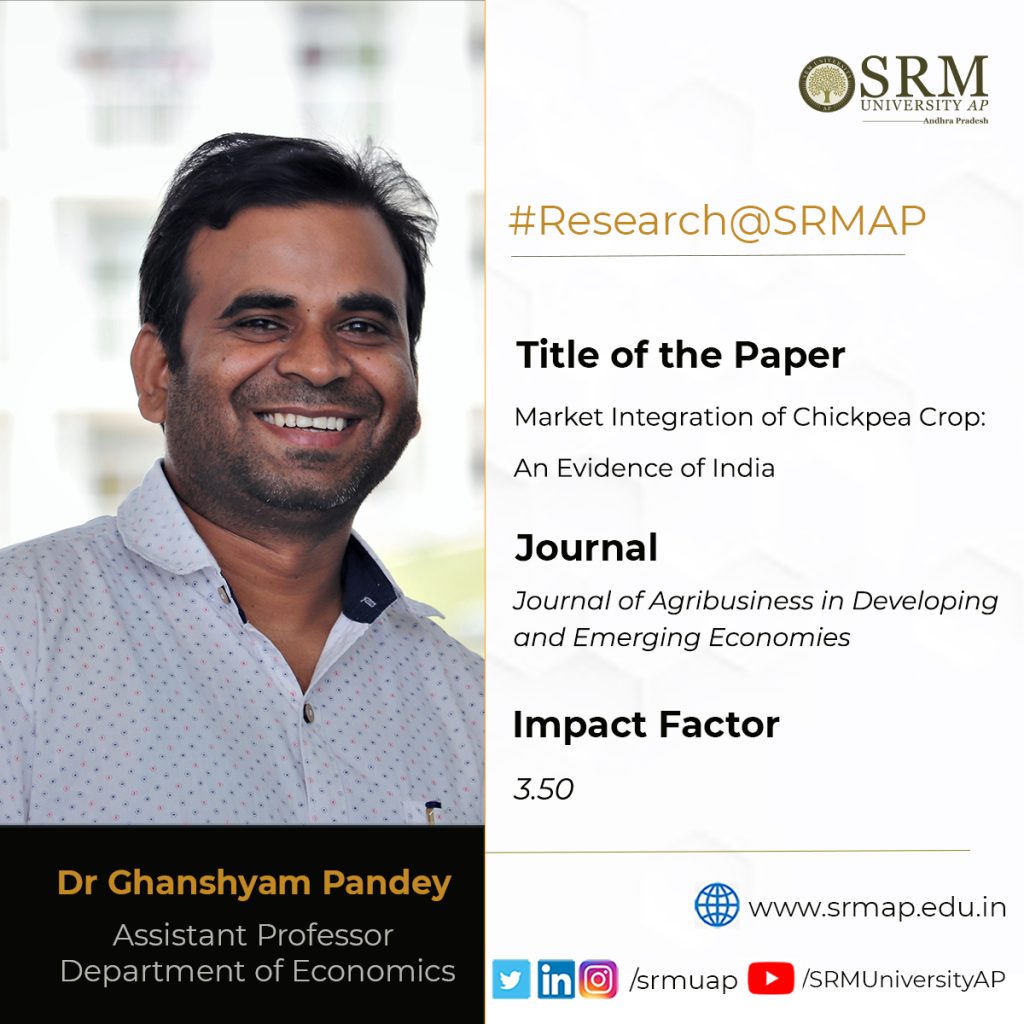
Dr Ghanshyam Kumar Pandey, Assistant Professor, Department of Economics has published a paper titled “Market Integration of Chickpea Crop: An Evidence of India”, in the esteemed Q1 Journal, Journal of Agribusiness in Developing and Emerging Economies having an impact factor of 3.50. Through this paper, Dr Pandey analyses the integration and direction of causality of prices of chickpea produce in the markets of India.
Abstract
Purpose – The purpose of this paper is to examine the market integration and direction of causality of wholesale and retail prices for chickpea legumes in major chickpea markets in India.
Design/methodology/approach – In this paper, the authors have employed the Johansen co-integration test, Granger causality test, vector autoregression (VAR), and vector error correction model (VECM) to examine the integration of markets. The authors use monthly wholesale and retail price data of the chickpea crop from select markets in India spanning January 2003–December 2020.
Findings – The results of this study strongly confirm the co-integration and interdependency of the selected chickpea markets in India. However, the speed of adjustment of prices in the wholesale market is weakest in Bikaner, followed by Daryapur and Narsinghpur; it is relatively moderate in Gulbarga. In contrast, the speed of adjustment is negative for Bhopal and Delhi, weak for Nasik, and moderate for retail market prices in Bangalore. The results of the causality test show that the Narsinghpur, Daryapur, and Gulbarga markets are the most influential, with bidirectional relations in the case of wholesale market prices. Meanwhile, the Bangalore market is the most connected and effective retail market among the selected retail markets. It has bidirectional price transmission with two other markets, i.e., Bhopal and Nasik.
Research limitations/implications – This paper calls for forthcoming studies to investigate the impact of external and internal factors, such as market infrastructure; government policy regarding self-reliant production; product physical characteristics; and rate of utilisation indicating market integration. They should also focus on strengthening information technology for the regular flow of market information to help farmers increase their incomes. Very few studies have explored market efficiency and direction of causality using both linear and nonlinear techniques for wholesale and retail prices of chickpeas in India.

- Published in Departmental News, Economics Current Happenings, Economics News, News, Research News
Economics Students Admitted to Esteemed Global Universities
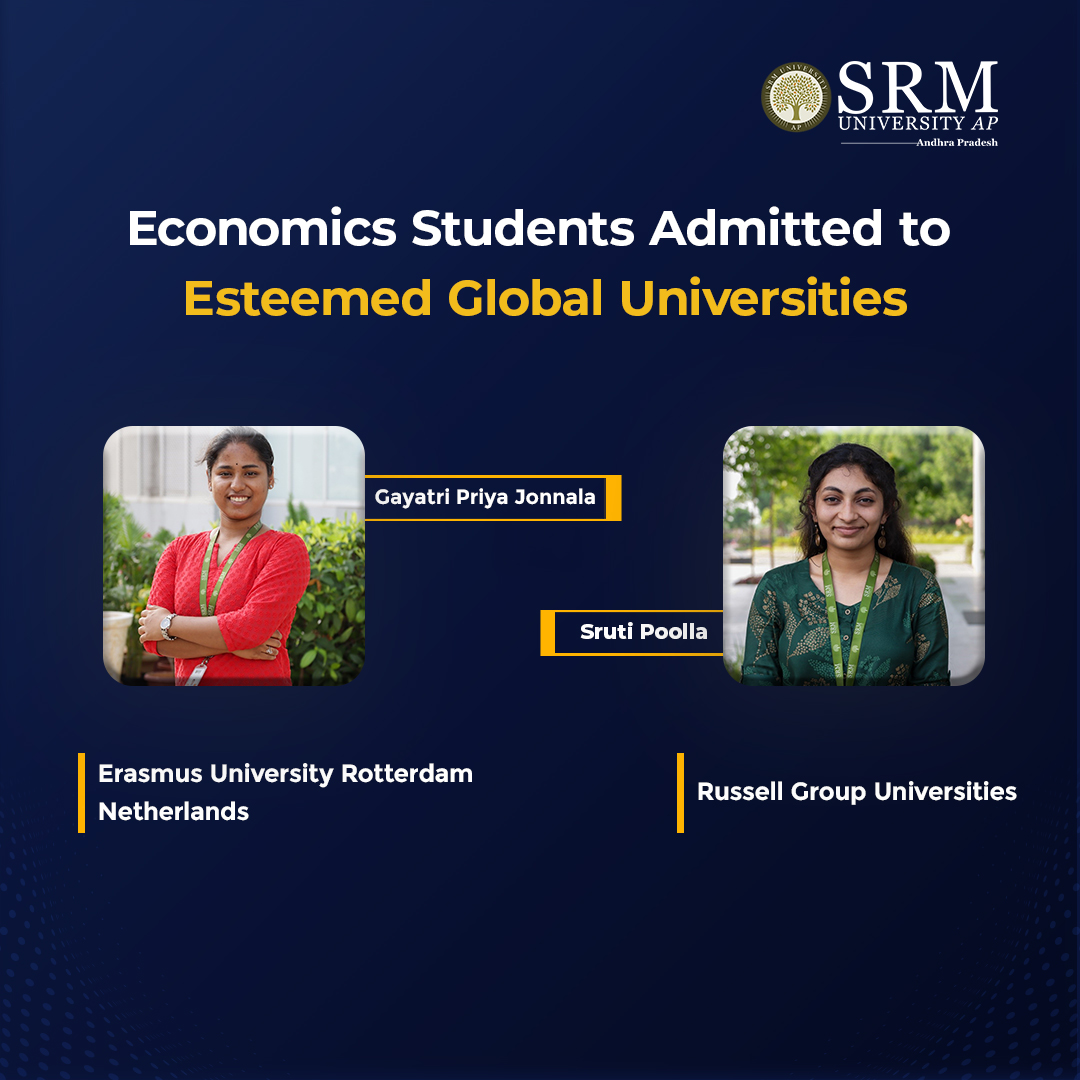 Getting into one of the global universities of great repute is an impactful motivation for every aspiring student to accomplish even greater things. It opens the gateway to a promising career they have been passionately dreaming of. Two exceptional students from the Department of Economics have been offered admission to highly esteemed international higher education institutions. Gayatri and Sruti, the final year Economics students of SRM University-AP, have been accepted into the Erasmus University Rotterdam, Netherlands, and the Russell Group Universities.
Getting into one of the global universities of great repute is an impactful motivation for every aspiring student to accomplish even greater things. It opens the gateway to a promising career they have been passionately dreaming of. Two exceptional students from the Department of Economics have been offered admission to highly esteemed international higher education institutions. Gayatri and Sruti, the final year Economics students of SRM University-AP, have been accepted into the Erasmus University Rotterdam, Netherlands, and the Russell Group Universities.
Ms Gayatri Jonnala was ecstatic while reading the offer letter to study MSc at a leading global university. She has been accepted into the Erasmus School of Economics at Erasmus University Rotterdam, Netherlands, an institution among the QS top 50 universities.
‘‘The curriculum at SRM University-AP is very similar to the requirements of a Master’s in Economics abroad. Taking part in co-curricular and extracurricular activities helps build a holistic statement of purpose. The reading material in the library for the English proficiency tests was adequate for good preparation’’, said Gayathri while elaborating on her learning experiences at the campus.
Ms Sruti Poolla was shocked and delighted to receive her offer letters from the world-renowned Russell Group Universities. She chose the University of Birmingham from the list of universities she has gotten accepted into. The Russell Group universities are known to be research intensive and very hard to get into because of their competitiveness. It is among the world’s top 100 universities, according to QS Ranking.
‘‘There was not much preparation I did. I had to write an English proficiency exam for which I prepared. The other aspects for admission were a statement of purpose, a letter of reference from my professors and my college transcripts. I can say that I have had good grades since my first semester, and my professors encouraged and trusted me enough to say good things in my LOR. The experience I’ve gained in my three years at SRM University-AP formed a good SOP for me to get accepted,” said Sruti while asked about her preparation strategy.
Sruti and Gayatri shared how the faculty of SRM University-AP have been very enthusiastic to know about their future plans and constantly encouraged all students to choose the right career option. The varsity’s curriculum has improved the students’ knowledge in various subjects, which will only be an advantage for them while pursuing further education. Sruti extended her gratitude to the Dean-Liberal Arts and Social Sciences and all the faculty at the Department of Economics.
‘‘My dissertation supervisor, Dr Manzoor Hassan Malik and Prof. Bandi Kamaiah, provided continuous guidance and support to receive the offer letter from a prestigious university, for which I’m very thankful,’’ added Gayatri.
Both look forward to a bright future after completing their master’s at reputed global universities.
- Published in Departmental News, Economics News, News, Students Achievements
- 1
- 2

